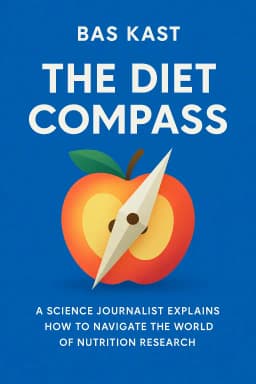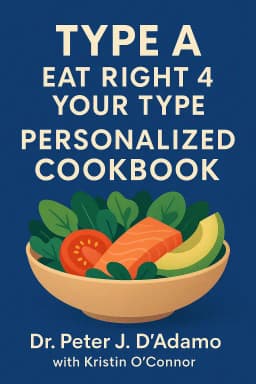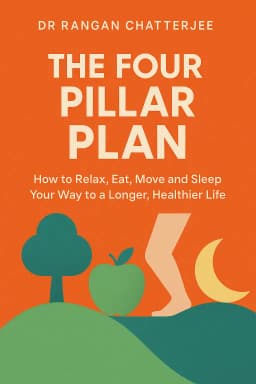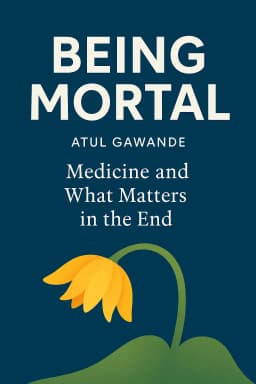
Crickets, Clocks & Cravings
Golden Hook & Introduction
SECTION
Laura: Okay, Sophia, a quick thought experiment. Two groups of people are fed an extra 750 calories every single day, in the form of delicious muffins. After seven weeks, both groups have gained the exact same amount of weight. Sophia: Right, that makes sense. Same calories in, same weight gain. Laura: But here's the twist. When scientists scanned their bodies, one group had turned half that extra weight into new muscle. The other group? They built zero muscle. Instead, they developed fatty livers and a lot more dangerous belly fat. Sophia: Wait, hold on. Same weight gain, but one group got stronger and the other got sicker? From muffins? How is that even possible? Laura: That is the central question that sent a German science journalist named Bas Kast on a mission. Today we are diving into his book, The Diet Compass. And what’s fascinating is that Kast wasn't a nutritionist or a doctor. He was a successful writer in his early 40s, a runner even, when he started having these terrifying chest pains. Sophia: Oh wow. So this was personal for him. Laura: Deeply personal. That health scare sent him on this multi-year quest, where he dug into thousands of scientific studies to separate fact from fiction. The book became a massive bestseller in Europe, and it’s basically the map he created for himself, and for us, to navigate the confusing world of nutrition. It all starts with understanding what our bodies are actually hungry for.
The Hidden Driver of Hunger: The Protein-Leverage Effect
SECTION
Laura: To explain the first big idea, we have to talk about something a little… strange. Mormon crickets. Sophia: Mormon crickets? Okay, I'm intrigued. This doesn't sound like a typical diet book. Laura: Not at all. In the American West, these insects form gigantic swarms, miles wide, marching across the landscape. But here’s the weird part researchers noticed: they weren't just eating plants. They were eating each other. If one cricket stopped moving, it was instantly devoured by the others. Sophia: Whoa, cannibalism? Why? Just pure aggression? Laura: That's what everyone thought. But two entomologists, Simpson and Raubenheimer, had a different idea. They set up an experiment. They put out different dishes for the crickets: one with pure carbohydrates, one with pure protein, and a few others. The crickets completely ignored the carbs. They swarmed the protein dish. Sophia: No way. They were specifically hunting for protein? Laura: Exactly. The cannibalism was a desperate hunt for protein. This led to their groundbreaking idea: the Protein-Leverage Effect. The theory is that animals, including us, have a powerful, instinctual drive to consume a certain amount of protein. We don't just feel "hungry"; we feel a specific hunger for protein, and we will keep eating until that target is met. Sophia: Okay, my mind is kind of blown. Are you saying that I'm basically a giant, slightly less cannibalistic cricket? Is that why after I eat a huge bowl of pasta, I sometimes still feel like I'm craving… something else, like a piece of chicken or some cheese? Laura: That is precisely what the theory suggests. Your body's "protein-stat" is still going off. To prove this in humans, the same researchers conducted a brilliant study. They took a group of people to a chalet in the Swiss Alps. For a few days, they let them eat from a buffet with a low-protein selection—lots of croissants, fruit, pasta, vegetables. Then they switched to a high-protein buffet. Sophia: And what happened? Laura: On the low-protein days, the subjects instinctively ate 39% more calories. They just kept eating, trying to hit their protein target. On the high-protein days, their needs were met quickly, so they felt full and naturally ate 38% fewer calories. They weren't counting calories; their bodies did it for them. Kast quotes the researchers, who concluded, "We don’t stop eating until our hunger for protein is sated." Sophia: That is a revelation. It reframes overeating completely. It’s not a failure of willpower; it’s a biological signal getting hijacked. So, if the food we're surrounded by is low in protein, we're basically doomed to overeat? Laura: That's the modern trap. Think about highly processed foods. A bag of potato chips, cookies, sugary drinks, even some breads. They are engineered to be delicious, but they are incredibly protein-diluted. They're packed with cheap fats and refined carbs. So you can eat an entire family-sized bag of chips, feel physically full, but your brain's protein sensor is still screaming, "Keep searching!" Sophia: And the search continues… straight to the next snack. It also explains why a simple bowl of Greek yogurt or a handful of nuts can feel so much more satisfying than a candy bar with the same number of calories. Laura: Exactly. The yogurt is hitting the protein target. The candy bar is just noise. Kast points out the difference between farmed and wild salmon. Farmed salmon is often much fattier, diluting the protein. You have to eat far more calories from the farmed salmon to get the same protein punch as you would from the wild version. Sophia: So the first point on this "diet compass" is to make sure you're pointing your fork towards protein. Not necessarily to eat a massive steak every day, but to ensure that what you are eating has a decent protein ratio to satisfy that ancient, cricket-level craving. Laura: You got it. It’s about leveraging protein to work with your body's instincts, not fight them.
Food as a Clock-Setter
SECTION
Sophia: Okay, so what we eat is clearly about hitting that protein target to manage our hunger. But the book is called The Diet Compass, which implies a sense of direction… and maybe timing? That muffin experiment you mentioned at the start feels like there's another layer here. Laura: There is. And it’s arguably even more revolutionary. Kast argues that when you eat can be just as important, if not more so, than what you eat. And the best way to understand this is with another incredible animal study from the Salk Institute. Sophia: I'm ready. More crickets? Laura: This time, it’s mice. Researchers took two groups of genetically identical mice. They fed both groups the same terrible, high-fat, high-sugar junk food diet. The kind of diet that should make any living creature sick. Sophia: A recipe for disaster. What was the variable? Laura: Just one thing: timing. The first group of mice could eat their junk food whenever they wanted, 24/7. The second group was given the exact same food, the same number of calories, but they could only eat it within an 8-hour window each night, which is when mice are naturally active. For the other 16 hours, they had to fast. Sophia: Okay, so what happened to them? Laura: The results were stunning. The 24/7 eaters got exactly what you’d expect: they became obese, developed high cholesterol, fatty liver disease, and signs of diabetes. They were a mess. Sophia: And the 8-hour mice? Laura: They stayed slim, healthy, and energetic. They showed no signs of metabolic disease. On the exact same junk food diet. The only difference was the eating window. Sophia: That is unbelievable. That completely breaks the "a calorie is a calorie" rule. So you’re telling me my late-night pint of ice cream is metabolically different from that same pint of ice cream eaten in the afternoon? Laura: That's what the science is pointing to. And the reason is something called our circadian rhythm. We tend to think of our internal clock as just controlling sleep, but it’s so much more. More than half of the genes in our body operate on a 24-hour cycle. Your liver, your pancreas, your digestive system—they all have peak operating hours and then a downtime for repair and maintenance. Sophia: So eating late at night is like showing up at an office after everyone has gone home and demanding they run a full-scale project? Laura: That's a perfect analogy. You're asking your body's "night crew," whose job is to clean and repair, to suddenly deal with a massive influx of fuel. Their response is inefficient. They're not prepared to process it properly, so they're much more likely to just shuttle those calories straight into fat storage. It also disrupts their cleaning work, a process called autophagy, which is crucial for preventing diseases and slowing aging. Sophia: This makes so much sense. It’s not about some extreme, multi-day fast. It's just about giving your body a predictable, daily break. A 12 or 14-hour pause. So, for a human, that could be as simple as finishing dinner by 7 PM and not eating again until breakfast at 7 AM. Laura: Exactly. It's called Time-Restricted Eating, or TRE. It’s about aligning your eating patterns with your body's natural clock. Kast even points to human studies showing that when people eat the same number of calories, the group that eats a big breakfast and a small dinner loses significantly more weight than the group that eats a small breakfast and a big dinner. Our insulin sensitivity is highest in the morning and drops throughout the day. Sophia: We’re just built to be front-loaders. Eat when the sun is up, rest when it's down. It’s so simple, it’s almost primal.
Synthesis & Takeaways
SECTION
Laura: And that’s really the beauty of what Kast pulls together in The Diet Compass. It’s not a list of forbidden foods or a complicated meal plan. It’s a set of guiding principles based on our own biology. The compass has two main needles. One points toward protein, to satisfy that deep, instinctual hunger and prevent overeating. Sophia: And the other needle points toward timing. To align your eating with your body's ancient, internal clock, giving it the rhythm it needs to function properly. Laura: Exactly. It’s a framework for working with your body, not waging a war against it with calorie-counting and sheer willpower. Sophia: You know, what I love about this is how it dismantles the shame around diet and weight. We’ve been handed the wrong user manual for our bodies. We've been told it's a simple calculator—calories in, calories out. But it's not. It's a deeply complex, information-processing clock. And when you give it the wrong information—protein-diluted food—or give it information at the wrong time—like 11 PM—of course it's going to malfunction. Laura: That's the core insight. And Kast's final, most important point is that the ultimate key is you. He presents all this research not as a rigid dogma, but as a compass to help you find your own path. He encourages you to experiment. Maybe a lower-carb approach works for you because you're insulin resistant. Maybe you thrive on a Mediterranean diet rich in healthy fats. The principles remain the same: get enough protein, and give your body a break. Sophia: It feels so much more empowering than being told "eat this, not that." It’s about understanding the 'why' behind it all. For everyone listening, I think the most powerful takeaway is to just start observing. Don't even change anything at first. Just notice: when do you eat? And how much protein is in your meals? That awareness alone is a huge first step. Laura: A perfect place to start. And maybe try one small experiment. Just try closing the kitchen after dinner tonight and see how you feel in the morning. Sophia: I love that. A simple, powerful action. It’s about finding what makes your own compass point north. Laura: This is Aibrary, signing off.









